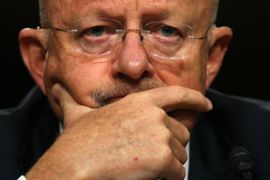‘Dangerous new period’ from N Korea
US spy chief nominee says Cheonan sinking may signal period of direct attacks on South.

‘Pose a threat’
“The most important lesson for all of us in the intelligence community from this year’s provocations by Pyongyang is to realise that we may be entering a dangerous new period when North Korea will once again attempt to advance its internal and external political goals through direct attacks on our allies in the Republic of Korea,” Clapper wrote.
“Coupled with this is a renewed realisation that North Korea’s military forces pose a threat that cannot be taken lightly.”
Clapper, who currently serves as intelligence adviser to Robert Gates, the defence secretary, as well as the Pentagon’s liaison to the director of national intelligence, was a top defence official dealing with North-South tensions on the Korean Peninsula in the 1980s, at a time when he said violent provocations by Pyongyang were more common than during the last decade.
Tensions between North and South Korea remain high following the March sinking of the South Korean naval vessel, Cheonan, killing 46 South Korean sailors.
Pyongyang has denied responsibility and escaped censure this month from the United Nations, which condemned the attack but did not explicitly blame North Korea.
Military exercises
Gates, on a visit to South Korea, and Kim Tae-young, the South’s defence minister, announced a major military exercise on Sunday in the Sea of Japan.
|
Roger Wilkison reports on the extent of private sector involvement in US intelligence |
The drill will involve some 20 ships, including the 97,000-tonne aircraft carrier USS George Washington and some 200 fixed-wing aircraft, according to military officials.
North Korea denounced the drill as “very dangerous sabre-rattling”.
It is “aimed at further straining the already deadlocked inter-Korean relations and igniting a nuclear war against the DPRK [North Korea], while watching for a chance,” the Minju Joson, North Korea’s cabinet newspaper, said in a commentary.
Gates also announced that he and Hillary Clinton, the US secretary of state, would visit the Demilitarised Zone (DMZ) on Wednesday.
Clinton, whose husband Bill Clinton called the DMZ “the scariest place on earth” when he visited as US president in 1993, said the trip was meant to show solidarity with Seoul after the sinking of the Cheonan.
“It’s particularly timely to show our strong support for South Korea, a stalwart ally, and to send a very clear message to North Korea,” Clinton told reporters ahead of her trip.
Clinton and Gates are expected to arrive in the morning at the DMZ, the no-man’s land between the two Koreas and the last Cold War flashpoint.
‘Volatile region’
Gates, speaking to reporters at a US military base just south of the DMZ on Tuesday, said the trip was “a useful reminder that we are in an armistice and that this is a volatile region, as we saw with the Cheonan”.
 |
| Robert Gates and Hillary Clinton are expected to visit the DMZ on Wednesday [EPA] |
The armistice signed in 1953 halted fighting between US-led UN forces backing South Korea on one side, and Chinese and North Korean troops on the other.
But the truce has never been converted into a peace treaty, leaving the two Koreas technically still at war.
Despite the strong rhetoric, US defence and intelligence officials acknowledge options are limited in dealing with North Korea.
And Pyongyang meanwhile has recently signalled it wants a return to talks with regional powers on its nuclear programme.
Analysts say Washington and Seoul are reluctant to head back into the nuclear talks, which the North has previously used to extract benefits from the international community while still pressing ahead with efforts to develop a nuclear arsenal.
But they may have little choice with Washington nervous about North Korea’s potential to export atomic weapons.